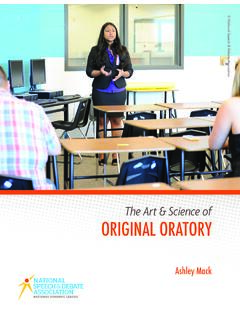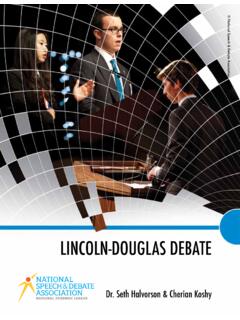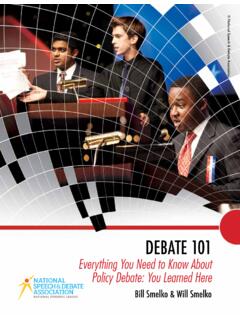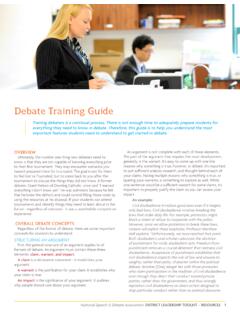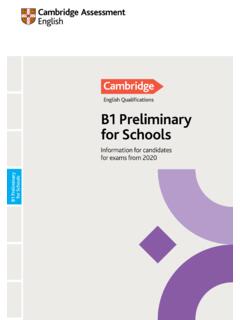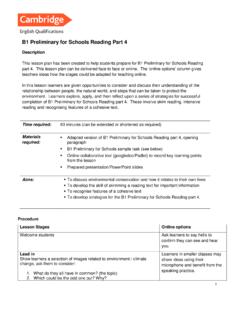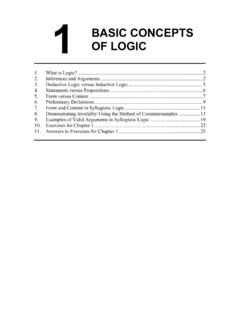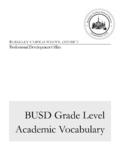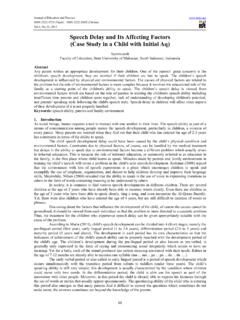Transcription of Lincoln-Douglas Debate: An Introduction
1 Lincoln-Douglas debate : An Introduction Abstract: Are you new to LD and wondering what this activity is all about? The purpose of this article is to help explain the background and basics of lincoln - douglas debate so that you may prepare to competitively participate in the activity. This is a great starting point for anyone interested in learning about LD. be it a teacher who wants to add this event to their squad, or a student looking to compete. A History of LD debate : How Did it all Begin? In 1858 there was a Senate Race in Illinois between Abraham lincoln and Stephen douglas . At the time, Stephen douglas was the incumbent, but in an attempt to take douglas 's seat, lincoln challenged douglas to a series of debates.
2 Although the exact format of the debates were slightly different than the Lincoln-Douglas of today (back then the first speaker spoke for 60 minutes, the second had a 90 minute rebuttal, and then the first speaker had a 30 minute rebuttal/time for closing arguments) the adversarial nature of the debates was similar. What is Lincoln-Douglas debate Now? Lincoln-Douglas debate (more commonly referred to as LD) is a competitive speaking activity that involves two debaters arguing for and against a resolution that is selected by the NFL. (National Forensics League) and voted on by coaches. Today, somewhat like the old debates, LD. focuses on the conflicting values of social and philosophical issues, for example, by examining questions of morality, justice, democracy, etc.
3 Typically, LD debates concern themselves with deciding whether or not certain actions, or states of affairs, are good or bad, right or wrong, moral or immoral. What Do We debate and Who Debates? LD debaters' debate predetermined topics or resolutions. On August 15th, every year, the first topic for the season is announced. This gives debaters until early September to begin research on the topic. In LD, topics change every two months, with the next topic being announced one month prior to it being debater. So, the September-October topic is announced August 15th, the November-December topic is announced November 1st, the January-February topic is announced December 1st, and so on.
4 But what is a resolution? A resolution is a statement or an assertion that places two sides in conflict. For example, Resolved: In a democratic society, felons ought to retain the right to vote.. 125 Watson Street, PO Box 38, Ripon, WI 54971-0038 (920) 748-6206 Created by Josh Roberts 2012 Lincoln-Douglas debate : An Introduction As evidenced by the adversarial nature of debate , there are two sides to each debate , and these are known as the Affirmative and the Negative. The affirmative debater upholds, affirms, or agrees with the resolution. Their job is to present arguments in order to persuade the judge that the resolution is true. The negative debater, on the other hand, disagrees with the resolution and presents arguments to persuade the judge that the resolution is false.
5 Each debater is responsible for arguing, or advocating, for his or her side of the resolution in front of a judge who decides which side of the resolution they will vote for based on the arguments presented in the debate round. Debates most important concept is forced choice, which is also known as clash. This means that the judge is required to select (vote) between two mutually exclusive propositions. For example, if you are forced to choose between buying a soda and keeping your dollar, you can only choose one of those options. If you are having trouble figuring out the conflict scenario in the resolution, add the word NOT into the text to give you an idea as to what the negative must defend.
6 Resolved: In a democratic society, felons ought not retain the right to vote. This will also help you with other resolutions, as some of them will be negatively worded. How Does LD debate Work? In each preliminary round, one debater is assigned to defend the affirmative, and the other debater is assigned to defend the negative. During the course of the tournament, you will be forced to defend both the affirmative side and the negative side many times. In each round, you will be assigned a flight (1st or 2nd), a room, an opponent, and a judge. In the debate , you will present a case that you have prepared before the tournament defending your side of the resolution, make arguments against the case your opponent presents, and answer the arguments that your opponent makes against your case.
7 Based on the strength of your arguments, how persuasive you are, and other factors, you will be awarded with either a win or a loss. Judges will also give you speaker points (on a scale of 1-30) based on how well you debated and spoke. The structure of tournaments is as follows: the first few rounds, anywhere from 3 to 8, will be preliminary rounds. The purpose of these rounds is to develop a ranking within the tournament that will determine who proceeds to elimination rounds. Tournaments will break 1 anywhere from the top 64 to the top 4 debaters (depending on the size) to elimination rounds. Those debaters that will compete in these rounds are the debaters that had the best overall record and speaker points from the prelim rounds.
8 If you make it to elimination rounds, then you continue to debate as long as you win. At most tournaments, your elimination rounds will contain three judges (known as a panel) instead of one judge like prelims. Tournaments, typically, give out trophies for those that place well, as well as for those that have good speaker points. Speaker points are not only a way to win trophies, but also play a very important role in seeding 2 debaters for elimination rounds. 1 To break means, simply, to advance past elimination rounds. 2 Much like the NCAA tournament, debate tournaments determine which debaters deserve to be at the top of the bracket based on the number of wins that debater accumulates in prelims, Created by Josh Roberts 2012 Lincoln-Douglas debate : An Introduction What Skills are Necessary to be a Good LD Debater?
9 To be an effective LD debater at any level, you need to possess a few skills. First, and foremost, the ability to communicate is crucial. If you have great arguments to make, but lack the ability to explain them to a judge who may very well know nothing about the topic you are debating, then you won't win very many rounds. Your job is to convince the judge that what you are defending is true, which requires the ability to connect with them and explain arguments in a way that makes sense to them. Being a good communicator may be the most important skill that you can possess in LD, and is one that will serve you well throughout your life. You need to be able to take a complex message and be able to explain your argument in a way that someone with no experience on the topic can understand and agree with your point.
10 You also need to be able to communicate clearly in a written manner. What I mean by this is that you need the ability to write clearly and concisely in order to communicate, in case form, your arguments to the judge. You must also have great listening skills. These are important because there is another debater in the round trying to disprove what you are saying, so if you are not listening to what they have to say, you will be ill-prepared to answer their arguments and effectively defend your position. One of the most undervalued skills in LD is the ability to efficiently research. The arguments that you present in round will very rarely be your own thoughts or opinions. Instead, your job in the time leading up to the tournament is to research and become an expert on the topic.

